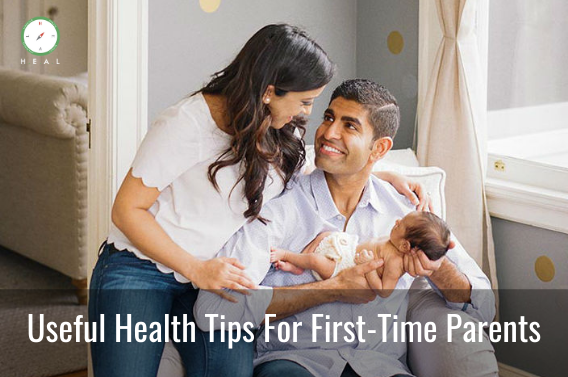Becoming a new parent tends to trigger an array of emotions, from joy and excitement to anxiety and fear. It is quite natural! But how do you cope with such emotions and that long-lasting and severe mood disorder?

The postpartum period begins after the delivery of your baby and ends when your body has nearly returned to its pre-pregnant state. This period often lasts 6 to 8 weeks. The postpartum period involves your moving through many changes, both emotionally and physically. You are also learning how to deal with all the changes needed with becoming a new mother. The postpartum period also involves you and your partner learning how to care for your newborn and learning how to function as a changed family unit. From anxiety-ridden conception to a no-frills empowered parenting approach is what Vidhi Beri, a renowned Global Educator, and Specialist in the fields of Holistic Health, Lactation, Maternal Health Wellness, Child Nutrition, and Children's Milestone Development with effective and well-structured maternity wellness programs offer to the new wave of freshly home-grown Indian mommies and babies, with her desi tadka of Ancient Indian sciences in her latest book, Decoding Motherhood, one of the best parenting books. So, read on-

Emotional bonding is the secure attachment that develops between parents and children. Successful bonding tends to allow the child to feel safe enough to develop fully, and having this bond will affect the way in which they communicate and form relationships throughout his or her life. A strong secure bond is formed forms when the new parents tune in and respond to the child’s needs or emotional cues, such as picking them up, soothing them, hugging them, kissing them, and reassuring them when they cry. Being that dependable source of comfort allows the child to learn how to manage their own feelings and behaviors, which, in turn, helps to strengthen their overall cognitive development in the future.
Some first-time parents feel an instant rush of love the moment they set eyes on their baby, while for other new parents, it may take some time, which is quite natural, do not feel anxious or guilty. Sometimes, it can take weeks or even months - to feel that emotional attachment, but it does come with time! Learning to bond with the baby tends to benefit both new parents and the child. Close contact with the infant releases oxytocin, the “love” or “cuddle hormone.” An increase in oxytocin makes first-time parents feel happier, more caring, and sensitive to the feelings of others, and it enables them to recognize nonverbal cues from the baby more readily.

Sleep when the baby sleeps” is a phrase often used by those giving new parents advice — advice that parents usually roll their eyes at. After all, getting any form of sleep while looking after a newborn is a tricky task. Getting a good amount of sleep at night is very important for maintaining proper mental and physical health in addition to proper diet and physical exercise.
Poor sleep leads to a lot of hormonal imbalance such as insulin, cortisol, leptin, and ghrelin A human brain requires at least seven to eight hours of quality sleep in order to go through all the five stages of the sleep cycle. It is advisable that if the new parents have family or friends who can look after the baby while they take a nap, be sure to enlist their help as suggested by Vidhi Beri. From anxiety-ridden conception to a no-frills empowered parenting approach is what Vidhi Beri, a renowned Global Educator, and Specialist in the fields of Holistic Health, Lactation, Maternal Health Wellness, Child Nutrition, and Children's Milestone Development with effective and well-structured maternity wellness programs offer to the new wave of freshly home-grown Indian mommies and babies, with her desi tadka of Ancient Indian sciences in her latest book, Decoding Motherhood, one of the best parenting books.

Doing physical activity on a daily basis tends to have a significant positive influence on the hormonal health of a human being. One of the major benefits of heavy physical activity is that it helps to reduce the insulin level and increase the overall insulin sensitivity. Insulin is a hormone that tends to have multiple functions. One of the significant functions of insulin is that it allows the cell to take sugar and amino acids from the blood which in turn is used for generating energy and maintaining muscle strength.
For people who may not able to perform hardcore exercises especially the senior citizens, regular walking may also help increase the hormonal levels which in turn would help to increase the overall strength and quality of life. One can begin gentle exercise just a few days after birth if you have had a healthy pregnancy and uncomplicated vaginal delivery. Walking is a good starting point, with the added bonus of being able to push the stroller at the same time. Aim to be active for around 20–30 minutes per day. Even exercising for 10 minutes can benefit the body. In addition, the local fitness club may run classes such as dance, Spinning, Pilates, or yoga. Nowadays then there are several fitness DVDs and online fitness programs that one can do from the comfort and privacy of the home.
From anxiety-ridden conception to a no-frills empowered parenting approach is what Vidhi Beri, a renowned Global Educator, and Specialist in the fields of Holistic Health, Lactation, Maternal Health Wellness, Child Nutrition, and Children's Milestone Development with effective and well-structured maternity wellness programs offer to the new wave of freshly home-grown Indian mommies and babies, with her desi tadka of Ancient Indian sciences in her latest book, Decoding Motherhood, one of the best maternity books. Visit Vidhi Beri’s official website to know more.